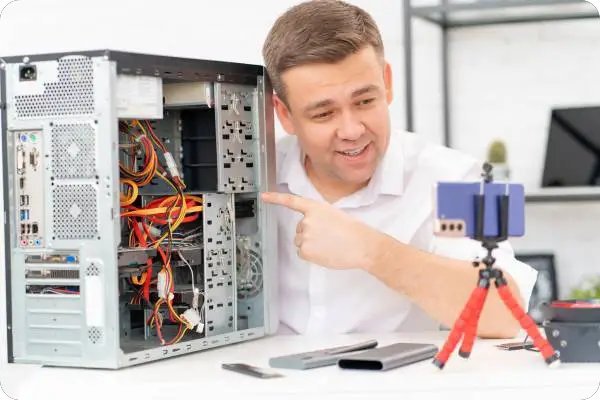
T-Mobile US, America’s supercharger Un-carrier, offers the advanced 4G LTE and 5G network that will offer access to the internet to everyone. T-Mobile is owned by Deutsche Telekom, the German telecom giant. The brand operates in parts of Europe, but the U.S. is its largest territory with over 109 million mobile customers (as of March 2022). Customers of the Un-carriers enjoy an unbeatable combination of value and quality, and they can trust the Un-carriers to provide the best service experience.
Connect with the Expert via email, text or phone. Include photos, documents, and more. Get step-by-step instructions from verified Tech Support Specialists.
What Primary Account Holder?
The principal person who has full control of a financial institution’s accounts is referred to as the principal. Primary account holders are those that are liable for the debts and balances of their accounts, as well as the costs associated with the account being maintained. This account holder has the authority to make changes to the account, such as granting access to another person or granting cards to another person.
Account holders are also known as the people who make the first application to start a new account or to obtain credit. The creditor checks the primary account holders credit history in order to determine whether to authorize or deny the account.
Some banks provide the ability for account holders to change their names to be more visible to other customers and to enable other users to be able to access their accounts. This group of people is sometimes referred to as other account holders or, in the case of credit cards, as third party cardholders. Despite the fact that the main account keeper can permit other people to have access to the account, the principal account keeper remains responsible for all charges that are made on the account by the main account keeper and any other users on the account.
Connect with the Expert via email, text or phone. Include photos, documents, and more. Get step-by-step instructions from verified Tech Support Specialists.
Account holders can be authorized to have different types of financial accounts and different types of financial accounts can be authorized to have different account holders. Some people use debit cards to make purchases on their own accounts. With credit cards, the account holder also holds the right to refuse to approve any payments made on their account.
Types of Primary Account Holder Accounts
Account holders can be listed on various types of financial accounts. Here is a list of the accounts that are typically owned by one person: checking accounts and credit cards.

Check accounts.
Unlike credit cards, credit card companies require a person who is a primary account holder to provide a credit score to issue a card to them.
Checking and savings accounts generally do not involve as much of a thorough background check as credit card accounts. Some credit card issuers may even only issue one card to a single account holder. These types of accounts typically require that the account holder provide a variety of information to the credit card company in order to approve the account. This may include things like a full name, address, and Social Security number (SSN).
Credit Cards
Account holders use debit cards to make payments and get money from the account. Account owners can add credit cards to other people with the same name as the account holder. In many cases, this will mean that each person who uses the account will have their own card and have access to their credit lines.
Primary Account Holders of Debit Cards.
Primary account holders usually request to have their names added to their checking or savings accounts.
The person with the most money typically owns the business checking or savings accounts, and the bank will issue a credit card to them. Credit card issuers look at a creditor’s credit score when determining how much money to give a customer. Typically, the account owner requests that the credit card company issues several credit cards to other people who are able to access the account.
In many cases, credit card issuers will not even start trying to recover money owed to an administrator. The main credit card owner is the one who applies for the card. He or she may decide to change the card or credit limit, or cancel the card.

Help with setup and starting issues, blinking error lights & all your repair needs in just minutes
Ask a Repairman Live NowPrimary Account Holder vs. Secondary Account Holder
Generally, the account owner is responsible for the account and any money that an authorized user has deposited into the account. Account holders who have additional authority can transfer money to other accounts. Some accounts have multiple account holders.
Authorized users of an account are called second level account holders. Secondary account holders have the rights to act as authorized users on the accounts they own, if that person has the power to do so. Account holders who are authorized to do certain things on their accounts are called primary account holders. They are primarily responsible for managing money in the business account when the account holder is not executing any transactions to the bank.
In general, the person who sets up a second account cannot legally become responsible for the money that is in their account. This is because credit card companies do not have the authority to bring charges against a person if it causes a problem with the card or if it charges money to someone else to do something fraudulent or illegal. This also applies to any charges that an owner of a joint account makes on their credit card, even if only part of the money in the account is theirs. Primary account holders are also responsible for any charges that a third party may make on their account, including any money that a third party may request to take out of the bank account. A person who has the first name on the account is responsible for all charges that an individual makes on their account.
Account Holders (or Owners) of an Account handle all the money that is in their account. There are several types of accounts, and account holders can have different accounts. We will talk about accounts that are open to anyone who wants to open a joint account, such as T-Mobile or similar financial institutions.
Primary Account Holder vs. Authorized users.
Some banks allow people to have several accounts with the same company. All the other people who have a primary account can use the same features. Some financial institutions provide joint accounts that allow two people to be responsible for the money that is on the accounts. They include features that enable account holders to check account balances and make payments. Accounts shared with a couple or a child are commonly used by a couple. If a couple has more than one account, both account holders can be held accountable for all the charges that are placed on the account — not only for the amount that is credited to them.
They can add other account holders to the account, as well as add other people as their users. Accounts held by two people who have shared a common carrier can be liable for all charges made by them and any others who are authorized to use their accounts.
Can T-Mobile primary account holders see text messages?
Primary users on T-Mobile do not have access to text messages. But assuming that primary account holders are verified with the respective banks or if members of their families are subscribed to family allowance, their accounts are able to send them texts. In addition, I will discuss some of the features that are available to the other account holders, such as being able to track internet usage.
Max Anthony
Mainly Max Anthony is an athletics tutor & lives in Texas but that's not it. He's is also a music producer, content creator, record producer, writer, and session musician. He has been producing music and engineering at a lower level for over 5 years. His passions include quality music gear and that's what he loves to write about on HifiBeast. ( Shoot him an email now )
Help with setup and starting issues, blinking error lights & all your repair needs in just minutes
Ask a Repairman Live Now
